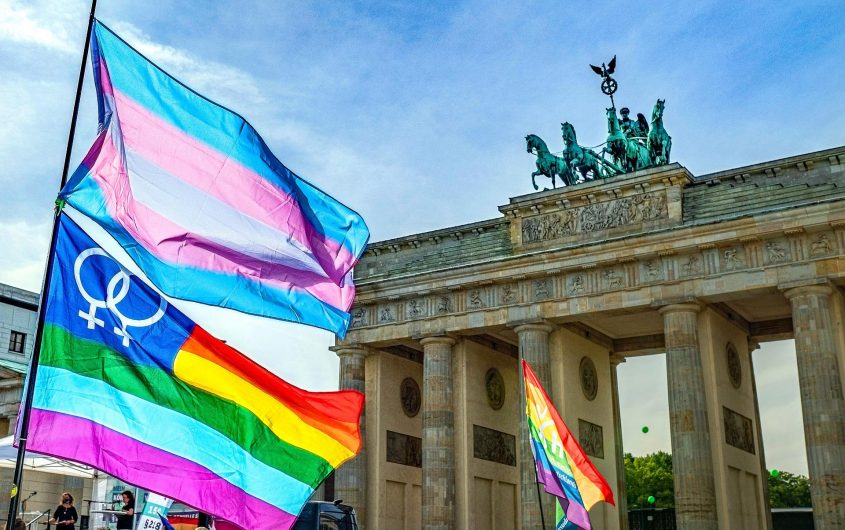
Sabrina Groeschke via Pixabay
Gender and Sexuality in the 2021 German National Election & Subsequent Coalition Agreement

Louise K. Davidson-Schmich
University of Miami
Louise K. Davidson-Schmich is Professor of Political Science at the University of Miami. Davidson-Schmich came to UM in 2000 after receiving her PhD and MA in political science from Duke University and completing her undergraduate degree in international relations at Brown University. In 2016 she was a New Zealand Fulbright US Scholar at the Victoria University of Wellington.
Her research interests include gender and politics as well as politics in long-term democracies. She is the author of Gender Quotas and Democratic Participation: Recruiting Candidates for Elective Office in Germany (University of Michigan, 2016) as well as Becoming Party Politicians: Eastern German State Legislators in the Decade Following Unification (University of Notre Dame Press, 2006). Davidson-Schmich is also the editor of Gender, Intersections, and Institutions: Intersectional Groups Building Alliances and Gaining Voice in Germany (University of Michigan, 2017) and of a 2011 special issue of the journal German Politics entitled “Gender, Intersectionality, and the Executive Branch: The Case of Angela Merkel.” Davidson-Schmich is a member of the executive committee of the International Association for the Study of German Politics and serves on the editorial boards of Women, Politics and Policy, German Politics, German Politics and Society, and the German Studies Association’s Spektrum book series. She has published in journals including Party Politics, The Journal of Legislative Studies, and Democratization and been awarded funding from the Alexander von Humboldt Foundation, Fulbright, and the National Science Foundation’s Advance program (called SEEDS at the University of Miami).
As is common in European multi-party systems, the 2021 German national election featured a broad range of party-political positions on salient contemporary issues. Just as in the United States where debates rage over reproductive rights and whether teachers can “Say Gay,” gender equality— including women’s issues and rights for lesbian, gay, bisexual, transgender, and intersex (LGBTI) Germans— divided the major German parties during the campaign. Below, I detail the programmatic differences among these parties and discuss how divisions were reconciled in the coalition agreement reached between the now-governing Social Democratic Party (SPD), Free Democratic Party (FDP), and the Greens.
While all parties’ programs agreed that gender inequality is present in Germany, the contenders disagreed over the nature of this inequality, its causes, and how it can be rectified. These differences were especially stark among the parties to the right of the political spectrum. The Alternative for Germany (AfD) identified state-sponsored affirmative action measures, such as gender quotas, as threats to constitutionally-guaranteed equality under the law. The AfD also lamented discrimination against men in divorce proceedings and custody disputes, as well as men’s exclusion from abortion counseling. For the AfD, the appropriate solution to these perceived problems was to stop affirmative action measures and to use state resources to promote nuclear, male-breadwinner families.
The Christian Democratic Union/Christian Social Union’s (CDU/CSU) joint platform viewed women mainly in their roles within the family and identified challenges women faced balancing care work and careers, proposing solutions such as longer daycare opening hours. The Union parties also referred to women as “the weakest in society” and “victims” of violence, calling for measures to combat human trafficking, domestic violence, and sexual abuse in sports.
The Free Democrats’ program pledged to promote “liberal feminism” in order to enable “freedom” and “self-determination … free from prescribed societal [gender] roles.” The FDP argued the solutions to gender inequality lie in removing state barriers to equality—for example, dropping rules allowing only married couples access to reproductive medicine—or in creating conditions encouraging private action to voluntarily address gendered inequalities, such as incentives for “angel investors” to fund women entrepreneurs.
The coalition agreement took a more measured approach to combat gender inequality, reflecting tensions between the FDP’s liberal feminism and the SPD and Greens’ state-centric approach.
There was more consensus to the left of the political spectrum regarding both the presence of widespread gendered inequalities in German society and the need for state-led, structural changes in an array of policy areas to achieve equality. These parties differed mainly in the scope of gendered inequalities they identified and the extent of state action they believed necessary for society to become more gender egalitarian. The Social Democrats attributed inequalities to a lack of “respect” for women in German society and proposed an array of economic measures to promote gender equality including paid time off from work for parents to care for sick children, improving state pensions, and offering free contraceptives.
The Left Party’s platform focused on gendered economic inequalities as well, calling capitalism “systemic sexism;” however, the Left also framed climate change as a gendered issue, identified gender differences in free time, and problematized symbolic inequities, such as sexist advertising. In addition to economic strategies such as abolishing the debt brake and spending more on social services, they proposed an array of policies—including women-friendly city planning and equal funding for the national men’s and women’s soccer teams—to grant women greater free time and social status.
The Greens’ platform contained the most extensive elaboration of structural barriers to gender-equal participation in democracy, maintaining, “gender justice is a multi-faceted task that we need to consider intersectionally. …. We need a binding gender justice strategy, that includes all areas of life and politics, that works across bureaucratic departments… [toward] achievable goals.” To that end, the Green platform proposed the use of gender budgeting and a “gender check” to assess the differential impact of all laws and policies on men and women. While the Greens agreed on economic measures akin to the SPD’s, they also called for improving domestic workers’ employment status, allowing unions to file lawsuits over systemic gender pay inequities, and banning feminized low wage/benefit “mini-jobs.” In addition, their platform gendered many other policy areas including health care (developing male contraceptives), culture (requiring quotas for women in leadership positions, stopping violence against women in online gaming), sports (building “gender sensitive” stadiums), security (combatting misogyny within the police), education (teaching accurate sex education), and foreign policy (detailing a “feminist foreign policy”).
The FDP, SPD, Left, and Greens had developed a broad consensus both on the nature of inequalities faced by sexual minorities in the Federal Republic and on an extensive catalog of state-sponsored measures to alleviate these inequities.
In addition to adopting an array of stances regarding inequalities faced by women, the parties also took distinct positions on LGBTI issues. The AfD’s platform expressly stated households headed by same-sex partners are not “families” and would not qualify for the party’s planned pro-family benefits. While the Alternative for Germany recognized that “a few individual people” were intersex, they did not see a need for any state action to benefit this group. Finally, their manifesto denied the existence of transgender Germans, arguing, “the human species consists of two sexes, male and female” that “can’t just be arbitrarily changed.” The CDU/CSU’s program did not contain any synonyms for anyone on the LGBTI spectrum and proposed no policies to combat inequalities faced by queer people. In contrast, by 2021, after sixteen years of consistent or on-and-off opposition to the socially-conservative Christian Democrats, the other four major parties (FDP, SPD, Left, Greens) had developed a broad consensus both on the nature of inequalities faced by sexual minorities in the Federal Republic and on an extensive catalog of state-sponsored measures to alleviate these inequities.
With one exception,[1] the coalition agreement reached among the FDP, SPD, and Greens following the election reflected this programmatic consensus, pledging sweeping state action to address inequalities faced by LGBTI Germans. The Traffic Light partners agreed to a National Action Plan for Sexual and Gender Diversity led by a newly-created Federal Government Commissioner (Sven Lehmann of the Green Party). Proposed components included a law banning anti-LGBTI hate crimes, expanding Article 3 of the Basic Law to include protections for people on the basis of sexual identity, repealing a ban on gay men donating blood, closing loopholes in bans on “conversion therapy” and “corrective” intersex surgeries, allowing transgender people to self-determine their gender on official identity documents, compensating trans and intersex victims of unwanted medical procedures, funding gender-affirming medical care, and recognizing both mothers as parents when a woman in a same-sex marriage gives birth. The coalition agreement also promised the creation of a “Verantwortungsgemeinschaft,” allowing up to four people to take legal responsibility for a child. Finally, the Traffic Light coalition also committed to promoting LGBTI rights abroad and assisting queer asylum seekers.
In contrast, the coalition agreement took a more measured approach to combat gender inequality, reflecting tensions between the FDP’s liberal feminism and the SPD and Greens’ state-centric approach. Nonetheless, the new government’s stance on women’s equality was considerably broader than any agreement that could have been reached with the Christian Democrats—or the AfD, had it been considered “coalition eligible.” The coalition pledged to “realize the equality of men and women” by employing gender budgeting, an “equality check” for legislation, and collecting information to close the “gender data gap.” Several measures included will have a disproportionately beneficial effect on women, although they were not framed as gender-equality measures in the agreement: raising the minimum wage, increasing state pensions, investing in public housing and transportation, and improving pay and working conditions for care workers and early childhood educators. The Traffic Light pact also promised to repeal Paragraph 219 of the criminal code banning abortion advertising, extend paid parental leave and a partner’s time off after childbirth, implement the Istanbul Convention on violence against women, reform assisted reproductive medicine policies, and adopt a feminist foreign policy. The agreement also included special initiatives proposed by each partner including the SPD’s plan for paid time off work for parents caring for sick children, an FPD program encouraging women to enter STEM fields, and Green measures for improving domestic workers’ working conditions, combatting digital violence against women, addressing trafficking, reducing incentives for C-sections, and extending parental leave to cases of stillbirth and late-term miscarriage.
The coalition agreement also reflected some of the core differences between the FPD’s liberal feminism and the SPD/Greens’ penchant for state actions to promote equality, however. While the latter parties called for legislated quotas for candidates for elective office, the agreement merely proposed a commission to discuss the issue; similarly, the SPD/Greens’ proposals to stiffen Germany’s anti-discrimination law, to shift the burden of achieving equal pay away from individual victims toward employers and/or unions, to abolish mini-jobs, and policies to achieve greater gender balance in the cultural sector did not find their way into the coalition agreement. Nonetheless, the new government is far from the Christian Democrats’ programmatic position, which ignores LGBTI Germans altogether and views women mainly as weak victims and sees them primarily in the context of their family.
[1] The one exception involved whether religious employers must follow federal non-discrimination employment laws. The Green platform had demanded this to protect LGBTI employees of church-run schools and hospitals. The Free Democrats, wary of state intervention in market relations, agreed merely to “check” with the church if such compliance would be possible.








